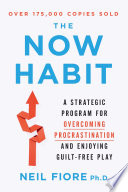

Procrastination is a complex behavior that often stems from fear of failure, perfectionism, and self-doubt. The author, Neil Fiore, emphasizes that procrastination is not merely a lack of willpower or motivation, but rather a coping mechanism for anxiety. By understanding the root causes of procrastination, individuals can begin to address the underlying issues rather than just focusing on the symptoms. This understanding helps to shift the mindset from seeing procrastination as a moral failing to recognizing it as a common human experience, which can be managed and overcome.
Continue readingOne of the key tools introduced in 'The Now Habit' is the Unschedule, which is a time management technique that encourages individuals to plan their leisure activities first rather than their work tasks. By scheduling enjoyable activities, individuals can create a sense of balance and motivation, making it easier to approach work tasks without feeling overwhelmed. The Unschedule helps to break the cycle of procrastination by ensuring that individuals engage in positive experiences, which can lead to increased productivity when they return to their work.
Continue readingFiore emphasizes the importance of incorporating play into daily life as a means to combat procrastination. Play is not just for children; it is a vital component of adult life that fosters creativity, reduces stress, and enhances overall well-being. By allowing time for play, individuals can recharge their mental batteries, leading to improved focus and productivity when they return to their tasks. This idea challenges the belief that constant work is necessary for success and instead advocates for a balanced approach to life.
Continue readingA positive mindset is crucial for overcoming procrastination. Fiore suggests that individuals should practice self-compassion and replace negative self-talk with encouraging affirmations. By fostering a supportive inner dialogue, individuals can reduce the anxiety and fear that often lead to procrastination. This shift in mindset allows for a more productive work environment, as individuals feel more empowered and motivated to tackle their tasks without the burden of self-criticism.
Continue readingSetting achievable and realistic goals is essential in combating procrastination. Fiore encourages readers to break down larger projects into smaller, manageable tasks. This approach reduces the overwhelming feeling that often accompanies big projects and makes it easier to get started. By celebrating small victories along the way, individuals can maintain motivation and momentum, making it less likely for procrastination to take hold.
Continue readingThe environment in which one works significantly impacts productivity and the tendency to procrastinate. Fiore advises readers to create a workspace that minimizes distractions and fosters focus. This includes organizing the physical space, as well as establishing boundaries with others regarding work time. A supportive environment can help individuals feel more in control and less likely to succumb to procrastination, as it encourages a proactive approach to completing tasks.
Continue readingLastly, Fiore discusses the power of commitment in overcoming procrastination. Making a commitment to oneself and others can create a sense of accountability that drives action. This can be achieved through various means, such as setting deadlines, sharing goals with friends or colleagues, or even joining a group focused on productivity. The act of committing to a task can transform the way individuals approach their work, reducing the likelihood of procrastination and enhancing overall productivity.
Continue readingThe reading time for The Now Habit depends on the reader's pace. However, this concise book summary covers the 7 key ideas from The Now Habit, allowing you to quickly understand the main concepts, insights, and practical applications in around 21 min.
The Now Habit is definitely worth reading. The book covers essential topics including Understanding Procrastination, The Unschedule Technique, The Importance of Play, providing practical insights and actionable advice. Whether you read the full book or our concise summary, The Now Habit delivers valuable knowledge that can help you improve your understanding and apply these concepts in your personal or professional life.
The Now Habit was written by Neil Fiore.
If you enjoyed The Now Habit by Neil Fiore and want to explore similar topics or deepen your understanding, we highly recommend these related book summaries:
These books cover related themes, complementary concepts, and will help you build upon the knowledge gained from The Now Habit. Each of these summaries provides concise insights that can further enhance your understanding and practical application of the ideas presented in The Now Habit.